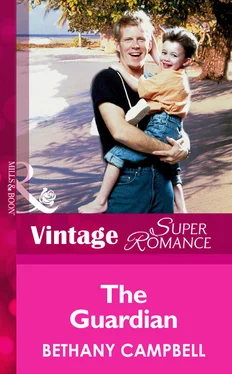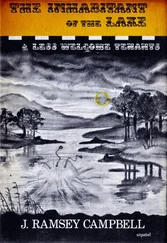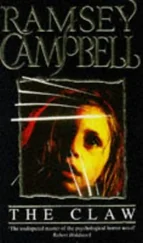The azure-blue of the sky framed the sharp angles of his profile. He looked at ease with himself, as much a part of nature as an eagle or a stag might.
He did not look up at her, and not even his slightest motion betrayed that he knew she was there. But he said, “Hello, Katherine. Bring out your coffee and sit down. We have things to talk about. By the way, your socks don’t match.”
She blinked in surprise and her gaze fell involuntarily to her feet. On one foot was a navy-blue sock, on the other a black one.
Almost reluctantly she came to his side. She sat down on the bench as far from him as she could. He sipped at his coffee, but he didn’t look at her.
“How did you know I was there?” she demanded. “How did you know I had coffee? How did you know my socks don’t match? You never even saw me.”
“I saw you,” he said in his soft growl. “It’s my business to notice things. Or it was.”
He had shaved. The lean planes of his face were clean, and the scent of something piney hovered about him.
“How long did you say you and Corbett worked together?” she asked uneasily.
“Fourteen years,” he said.
He raised his eyes to hers. They were keen eyes, and for the first time she realized they also seemed intensely intelligent.
“But you don’t want to talk about me,” he said. “You want to talk about where you are. Right?”
“Exactly,” she said. “Charlie’s already confused about everything. Somehow I have to explain this to him.”
“Right,” he said, turning his gaze from her. He set down his coffee mug. From a stack of papers on the table’s corner he drew out a map.
He unfolded it and set it between them. “This chain of islands is the Lower Keys.”
He picked up a red pen. She noticed the long, jagged scar on his right arm. With the precision of an artist or an engineer, he circled the last island in the chain. “That’s Key West, where you landed.”
She nodded mechanically. A breeze sprang up. From the corner of her eye, she saw how it fluttered the lock of hair that fell over his forehead.
“We came up the one main road,” he said, tracing a line. “We’re here, Cobia Key. We’re at the edge of the heron sanctuary. More or less surrounded by mangrove islands. Like I say, we’re isolated.”
His gaze met hers again, and it seemed to her that it held a strange mixture of coolness, distance, and unwilling hunger. Uneasy, she turned her face from his and stared out at the dark tangle of the mangroves. “You’re alone here?” she asked.
“Yes,” he said in a tone that implied, And that’s how I like it.
She heard gulls crying in the distance, but she realized that this place was oddly still, almost hushed. The landscape did not seem tropical or exotic. Instead it seemed brooding, the mangrove forests full of mystery.
She had imagined Florida abloom with flowers and bright with colorfully plumaged birds. She had not envisioned these thick, low woods, deep with secrets. It was an alien atmosphere, and she took a drink of coffee to steel herself against it.
“What is this place?” she asked, giving the worn deck a critical glance.
“It used to be a guide service. Mostly kayak tours. Not anymore.”
She looked at him questioningly. “You bought this when—when you retired from the service?”
“I inherited it,” he said. “When my father died.”
“I’m sorry,” she said, although she could detect no sorrow, no grieving in him.
“It’s getting ready to fall down,” he said from between his teeth. He tapped the map with the pen again. “But that’s where you are. What’s left of Hawkshaw’s Island Adventures. In Nowhere, Florida.”
“Over there,” she said, nodding toward the patch of green-gray water glinting between the trees. “Is that the ocean?”
“No. Just a channel.”
Unexpectedly he stood. The tattered shorts rode low on his hips. He handed her the map, his hand brushing hers. She found that the touch made her draw in her breath.
“Look,” he said. “I’m not much of a host. I’m out of practice. But can I get you something to eat?” he asked. “More coffee?”
“No,” she said hastily. “I’m fine. But Charlie will probably be hungry. I wish I’d thought last night to ask you to stop, to let me buy a few things.”
“It’s okay,” he said. “I put in plenty of supplies.”
Seeming restless, he moved to the edge of the deck and put his bare foot on the lower railing. He stared out over the trees.
“It’s going to get hot,” he said quietly. “Really hot. Can you feel it?”
CHAPTER THREE
THE BREEZE CHANGED DIRECTION, making the mangroves drone and sigh as if whispering ancient riddles.
Hawkshaw leaned his elbows on the top railing, not looking at her. The sun made his bare back and shoulders gleam like copper.
“So,” he said, “let’s talk about this mystery man, this stalker.”
Her stomach tightened. “I should go see if Charlie’s ready to wake up.”
“In a minute,” Hawkshaw said. “This guy—he’s been harassing you for a year and a half, right?”
“Yes.” And he’s brought me to this, she thought fatalistically. To depending on the kindness of strangers.
“You have no idea who he is?”
“None.” The word was a knot of gall in her throat. Suddenly, her future loomed before her with all its unspeakable uncertainty.
She was not even sure about her past. Was the stalker someone she knew? She had come to suspect, at one time or another, almost every man she knew.
Hawkshaw turned, almost lazily. He leaned back, his elbows resting on the railing. “So you went to Corbett.”
“I had to do something,” she said with a surge of spirit. “The police couldn’t help. I had to fight back someway.”
“You knew Corbett from before,” he said.
“Only in passing. His office—his and his partner’s—is in the same building as the bookstore. I checked him out. I heard his qualifications were excellent.”
“They are. Frankly, I’m amazed he hasn’t been able to ID this guy.”
She shook her head in frustration. “Every time he thinks he has a lead, it melts, turns into air. It’s like chasing a ghost.”
She knew that Corbett was good. But the stalker was better. Corbett had followed half a hundred clues and hunches, but they’d led only to half a hundred nowheres.
On Corbett’s advice, Kate had changed her phone number six times. She would have changed where she lived, but she could not find a buyer for the condo. She’d come to fear it would not matter if she did. The stalker would always find her, it seemed. She was stymied. So was Corbett.
Now, she who had prided herself on being so independent was on the run. By the harsh light of morning, it seemed an extraordinary and frantic move.
“You told nobody you were leaving Columbia?” he asked.
“Nobody,” she said. “Except my friend in Denver. I said we’d be coming soon. But I didn’t tell her where we’d be until then. I didn’t know myself.”
“And Corbett told nobody,” he said. “Not even his partner?”
“Not even him,” Kate said. She liked Corbett, but not his partner, Bedlingham. Bedlingham was married but flirtatious; to her it seemed he always exuded an air of sly, forbidden sexuality.
“And Corbett’s checked out the men closest to you?”
“Yes,” she said, although there weren’t that many.
George Chandler, her husband’s stepfather. George lived in the city, but he and Chuck had fallen out years ago. They had not socialized, had hardly spoken to each other.
There was Chuck’s brother, Trevor. Trevor lived in Minneapolis, where he was confined to his house because of multiple allergies and never went out. She communicated with him mostly by e-mail because it was cheaper than phoning. She felt guilty, for she had lied to him about what she was doing. She had told him she was taking the computer in for repair and would be out of touch.
Читать дальше












